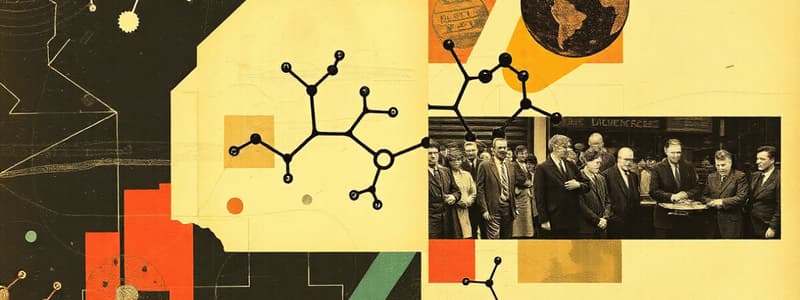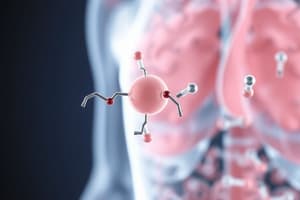Podcast
Questions and Answers
What occurs when a catecholamine or peptide hormone binds to receptors on the cell surface?
What occurs when a catecholamine or peptide hormone binds to receptors on the cell surface?
- The hormone is transported to the nucleus
- A second messenger appears in the cytoplasm (correct)
- The cell becomes inactive
- The cell membrane becomes less permeable
What is the link between a first messenger and a second messenger in response to peptide hormones?
What is the link between a first messenger and a second messenger in response to peptide hormones?
- cAMP
- cGMP
- A G protein (correct)
- Calcium
What happens when adenylyl cyclase is activated?
What happens when adenylyl cyclase is activated?
- cAMP is formed (correct)
- Steroids are produced
- Protein kinases are metabolized
- Calcium ions are released from intracellular stores
What typically happens when steroid hormones bind to their receptors?
What typically happens when steroid hormones bind to their receptors?
Where are steroid hormones synthesized in the cell?
Where are steroid hormones synthesized in the cell?
Which statement about peptide hormones is false?
Which statement about peptide hormones is false?
Which of the following correctly describes the role of second messengers?
Which of the following correctly describes the role of second messengers?
What is the primary function of a G protein in hormone signaling?
What is the primary function of a G protein in hormone signaling?
What type of hormone is characterized by binding to surface receptors and employing second messengers?
What type of hormone is characterized by binding to surface receptors and employing second messengers?
Which type of hormones interact with receptors on the surface of target cells?
Which type of hormones interact with receptors on the surface of target cells?
Which of the following is not an amino acid derivative hormone?
Which of the following is not an amino acid derivative hormone?
Most of the hormones present in the body are classified as which type?
Most of the hormones present in the body are classified as which type?
Which endocrine organ is involved in the most complex endocrine responses?
Which endocrine organ is involved in the most complex endocrine responses?
What hormone does the posterior pituitary gland primarily secrete?
What hormone does the posterior pituitary gland primarily secrete?
Which hormone controls the release of glucocorticoids from the adrenal cortex?
Which hormone controls the release of glucocorticoids from the adrenal cortex?
Which hormone is responsible for stimulating hormone synthesis in the thyroid gland?
Which hormone is responsible for stimulating hormone synthesis in the thyroid gland?
Which hormone stimulates milk production in the mammary glands?
Which hormone stimulates milk production in the mammary glands?
Which hormone is known for stimulating cell growth and metabolism in various tissues?
Which hormone is known for stimulating cell growth and metabolism in various tissues?
Flashcards are hidden until you start studying
Study Notes
Hormone Action Mechanisms
- Hormone actions include controlling electrical signaling pathways, ion/molecule transport across cell membranes, enzymatic reaction rates, and gene expression/protein synthesis.
Peptide and Catecholamine Hormone Action
- When peptide or catecholamine hormones bind to cell surface receptors, a second messenger appears in the cytoplasm.
Second Messengers
- G proteins are the usual link between first and second messengers in peptide hormone responses.
- Adenylyl cyclase activation leads to cAMP formation.
Steroid Hormone Action
- Steroid hormone binding to receptors typically increases or decreases gene transcription. Steroids are synthesized in the smooth endoplasmic reticulum.
Peptide Hormone Characteristics
- Peptide hormones are initially synthesized as prohormones, are short-lived in circulation, and interact with target cell surface receptors. They are not always bound to carrier proteins in the bloodstream. Prohormones can be activated before release through post-translational modifications.
Amino Acid Derivative Hormones
- Thyroid-stimulating hormone (TSH) is an exception among amino acid derivative hormones (thyroxine, norepinephrine, epinephrine, melatonin).
Hormone Abundance
- Peptide hormones constitute the majority of hormones in the body.
Complex Endocrine Responses
- The hypothalamus plays a central role in the most complex endocrine responses.
Posterior Pituitary Secretions
- The posterior pituitary gland secretes antidiuretic hormone (ADH), also known as vasopressin.
Pituitary Hormone Functions
- Adrenocorticotropic hormone (ACTH) controls glucocorticoid release from the adrenal cortex.
- Thyroid-stimulating hormone (TSH) controls hormone synthesis and release from the thyroid gland.
- Prolactin stimulates milk production in mammary glands.
- Somatotropin (growth hormone) stimulates cell growth and metabolism in various tissues.
Studying That Suits You
Use AI to generate personalized quizzes and flashcards to suit your learning preferences.




